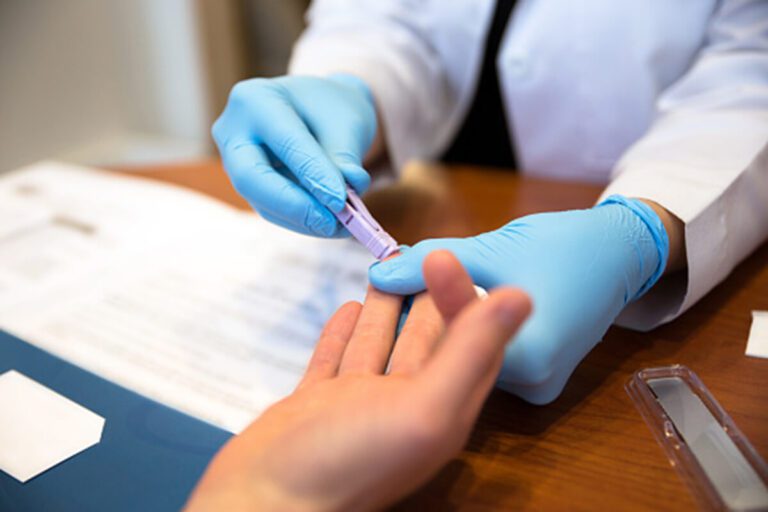The Role of Genetic Testing in STD Prevention
Genetic testing involves analyzing a person’s DNA to detect specific genetic markers that may indicate a predisposition to certain diseases or conditions. In the case of STDs, genetic testing can identify individuals who may be more susceptible to specific infections due to their genetic makeup. This can help healthcare providers assess the risk of an individual contracting an STD and develop more personalized prevention strategies.
Genetic testing can uncover mutations, genetic predispositions, or other variations linked to the body’s ability to resist or respond to diseases like HIV, HPV, and other infections. The results offer a clearer picture of a person’s health risks and guide healthcare professionals in recommending preventive care, lifestyle changes, or treatments.
How Genetic Testing Works
The process of genetic testing typically begins with a sample of saliva, blood, or tissue. The DNA is then analyzed to identify specific genetic markers associated with various diseases. In the context of STD prevention, these markers can help determine whether an individual is at a higher risk of contracting certain infections or suffering from complications.
Once the test is complete, results are typically provided within a few weeks. Depending on the test, the results may indicate genetic predispositions, mutations that affect immune response, or susceptibility to infections. These results allow healthcare providers to suggest more targeted prevention strategies or interventions based on an individual’s genetic profile.
Also Learn About: How Smoking and Alcohol Impact STD Risk and Recovery
The Importance of Genetic Testing in STD Prevention
Identifying Genetic Vulnerabilities to STDs
One of the most significant benefits of genetic testing is its ability to identify individuals who may be genetically predisposed to certain STDs. For example, some people carry genetic markers that make them more susceptible to HIV infection. In these cases, genetic testing can serve as an early warning, enabling individuals to take additional precautions and reduce their risk of contracting the disease.
Understanding genetic vulnerabilities allows healthcare providers to offer preventive care that is more suited to an individual’s specific needs, helping to reduce the overall transmission of STDs.
Personalized Health and Prevention Plans
Genetic testing plays a crucial role in developing personalized health plans. By understanding a person’s genetic makeup, healthcare providers can recommend personalized preventive strategies. For instance, if genetic testing reveals that someone is at high risk for contracting HPV or other infections, the healthcare provider may suggest vaccinations, more frequent screenings, or lifestyle changes to reduce the risk.
Personalized prevention plans ensure that individuals receive the best possible care based on their genetic risks, increasing the likelihood of successful STD prevention.
Early Detection of Infections
Another key advantage of genetic testing is its ability to detect latent infections or higher viral loads before symptoms appear. This early detection is particularly valuable because it allows individuals to seek treatment or take preventive actions before the infection spreads. Early treatment also increases the chances of better outcomes and reduces the risk of complications down the line.
How Genetic Testing Enhances STD Prevention
Improved Risk Assessment
Genetic testing helps individuals understand their risk level for contracting STDs, even in the absence of visible symptoms. By identifying genetic markers that increase susceptibility to certain infections, genetic testing provides a more accurate risk assessment than traditional screening methods. This deeper understanding helps individuals make more informed decisions about their sexual health, such as whether to engage in more frequent testing or use additional protection.
For example, individuals with genetic markers that indicate a higher risk of contracting HIV or other STDs might take extra precautions, such as using condoms consistently or considering pre-exposure prophylaxis (PrEP). This enhanced risk awareness allows for better prevention and reduced transmission of infections.
Tailored Preventive Measures
One of the key benefits of genetic testing is that it allows healthcare providers to recommend more targeted preventive measures. For example, if a person’s genetic test shows they are at higher risk for certain infections like HPV or HIV, healthcare providers can suggest more frequent screenings or vaccinations.
With genetic insights, preventive care can be customized to an individual’s needs. People at higher genetic risk may benefit from regular medical check-ups, specific vaccines (such as the HPV vaccine), or medications like PrEP. This individualized approach ensures that the preventive measures are more effective, potentially reducing the risk of developing infections.
Increased Awareness and Empowerment
Genetic testing empowers individuals by providing them with clear and actionable information about their health. When individuals understand their genetic risks, they are more likely to take proactive steps to protect themselves and their partners. This knowledge leads to greater awareness about sexual health and may encourage people to adopt safer practices, such as using barrier methods or seeking regular health check-ups.
By having the ability to access this kind of information, people can make better-informed decisions regarding their sexual behavior and health, which could ultimately lead to fewer cases of STDs.
Key STDs and the Role of Genetic Testing
HIV and Genetic Testing
HIV remains one of the most significant global health threats, with millions of people living with the virus. Genetic testing plays a critical role in identifying individuals who may be at a higher risk of contracting HIV. For example, genetic markers in the immune system, such as variations in the CCR5 gene, can determine how susceptible someone is to HIV. Those with certain genetic markers may have a natural resistance to the virus, while others may be more vulnerable.
Based on genetic testing, individuals at higher risk for HIV can take preventive measures, such as starting PrEP (pre-exposure prophylaxis) or using other strategies to reduce their risk of infection. Early identification of genetic vulnerability helps in making more informed decisions about sexual health and prevention.
HPV (Human Papillomavirus) and Genetic Testing
HPV is one of the most common STDs worldwide and is linked to several cancers, including cervical cancer. Genetic testing can identify individuals who may have a genetic predisposition to developing more severe complications from HPV infections, such as cervical dysplasia or cancer.
Hepatitis B and C
Hepatitis B and C are viral infections that can lead to long-term liver damage, cirrhosis, or liver cancer. Genetic testing plays an important role in identifying individuals who may be genetically predisposed to more severe outcomes from these infections. For instance, certain genetic variations can affect how the body responds to the virus, influencing the viral load and the progression of liver damage.
By identifying those at greater genetic risk, healthcare providers can tailor their care and monitor these individuals more closely. Genetic testing also enables healthcare professionals to recommend early intervention, such as antiviral medications, which can help manage the infection and prevent serious complications.
Chlamydia and Gonorrhea
Chlamydia and gonorrhea are bacterial STDs that can cause significant health issues if left untreated, including infertility. Genetic testing can help identify individuals who may be more likely to develop complications from these infections, such as pelvic inflammatory disease (PID) or chronic pain. Genetic markers may reveal factors that influence the body’s immune response to these infections, which can impact the severity of symptoms and the likelihood of long-term health issues.
In cases where individuals are at a higher genetic risk for complications, healthcare providers may recommend more frequent screenings and prompt treatment to prevent the spread of infection and avoid long-term damage.
Also Learn About: The Role of Meditation and Stress Management in STD Management
The Role of Hope Across The Globe in STD Prevention
Hope Across The Globe is a healthcare provider dedicated to improving sexual health through advanced testing and personalized care. The organization takes a proactive approach to STD prevention, offering a range of services that include genetic testing to identify those at risk for various infections. Through this comprehensive approach, Hope Across The Globe helps individuals better understand their health risks and make informed decisions about prevention and treatment.
Educational Outreach
Hope Across The Globe places a significant emphasis on education, ensuring that patients understand the importance of genetic testing and STD prevention. By providing clear, accessible information, the organization helps patients grasp the implications of genetic risk factors for STDs and the benefits of early detection.
The educational outreach programs also raise awareness about the role of genetics in sexual health, which can sometimes be overlooked. Hope Across The Globe actively works to ensure that individuals are aware of their genetic health risks, empowering them to take preventive measures to reduce the risk of STDs. Whether through direct consultations or community outreach programs, Hope Across The Globe ensures that people have the information they need to protect themselves and their sexual partners.
The Benefits of Genetic Testing in STD Prevention
Enhanced Risk Assessment
One of the most significant benefits of genetic testing is its ability to provide a more detailed and accurate risk assessment. While traditional STD testing primarily identifies active infections, genetic testing offers insight into an individual’s genetic vulnerabilities, even before any symptoms appear. This allows healthcare providers to assess an individual’s risk of contracting STDs, even in the absence of visible signs.
Understanding genetic vulnerabilities helps individuals make more informed decisions about their sexual health. It may also guide healthcare providers in recommending specific preventive care options that are tailored to the patient’s risk factors, enhancing the effectiveness of prevention efforts.
Improved STD Management
Genetic testing is not only useful for prevention; it also plays a critical role in managing existing STDs. For individuals living with chronic STDs, such as HIV, genetic testing can help determine the most appropriate treatment options based on their genetic profile. Some people may metabolize certain medications differently or have specific genetic mutations that affect their response to treatment. Genetic testing allows healthcare providers to select the most effective medications and treatment plans, minimizing the risk of complications and improving the chances of successful management.
Furthermore, for individuals who may be at greater risk of complications from STDs (such as infertility from untreated chlamydia or gonorrhea), genetic testing enables healthcare providers to monitor their condition more closely and offer early intervention.
Early Detection and Prevention
One of the most significant advantages of genetic testing is its ability to detect genetic predispositions and vulnerabilities before any physical symptoms of an STD arise. By identifying these risks early on, individuals can take proactive steps to protect themselves and their partners from infections.
Early detection helps prevent the spread of STDs and reduces the long-term health impacts associated with untreated infections. In many cases, early intervention can prevent the progression of infections, allowing for more effective treatment and reducing the overall burden on healthcare systems.
Empowerment Through Knowledge
Genetic testing offers individuals the opportunity to take charge of their health. With knowledge of their genetic risks, individuals can make informed decisions about their sexual health and take the necessary precautions to reduce their risk of contracting STDs. This empowerment helps people feel more in control of their health, leading to better preventive behaviors and healthier lifestyles.
Understanding genetic risks can encourage individuals to engage in more proactive health management, whether it’s through regular testing, using protection consistently, or seeking vaccination for diseases like HPV. By having a clearer picture of their genetic vulnerabilities, people are better equipped to make choices that safeguard their health and that of their partners.
Moreover, this knowledge promotes open communication about sexual health. Individuals who understand their genetic predispositions may be more comfortable discussing their risks with their partners, which can lead to more responsible decision-making and a greater commitment to shared sexual health practices.
Genetic Testing and Its Role in Jacksonville
In Jacksonville, like many other urban areas, STD rates are a significant public health concern. While traditional testing methods are effective for identifying infections, genetic testing offers an additional layer of protection by identifying individuals who may be genetically predisposed to certain STDs. By integrating genetic testing into the STD testing process, healthcare providers in Jacksonville can offer more personalized care, enhancing both prevention and treatment efforts.
The Importance of Genetic Testing in Jacksonville
Jacksonville has a diverse population, and with varying risk factors, the integration of genetic testing into STD prevention is increasingly important. People in high-risk groups, such as those with multiple sexual partners or individuals living with HIV, may benefit from a deeper understanding of their genetic vulnerabilities.
Genetic testing can help Jacksonville residents better understand their risk of contracting diseases like HIV, HPV, or hepatitis B. Armed with this knowledge, individuals can take proactive measures to protect themselves and their partners, such as using PrEP for HIV prevention or getting vaccinated for HPV. Additionally, it enables healthcare providers to create more accurate, targeted prevention plans for individuals at higher genetic risk, potentially reducing the spread of infections in the community.
By incorporating genetic testing into Jacksonville’s STD testing services, local healthcare providers can enhance the overall effectiveness of their prevention programs. This approach ensures that people are not just receiving a diagnosis, but also a deeper understanding of their health risks, leading to more informed, preventive decisions.
Related Tag: Free STD Testing Jacksonville





